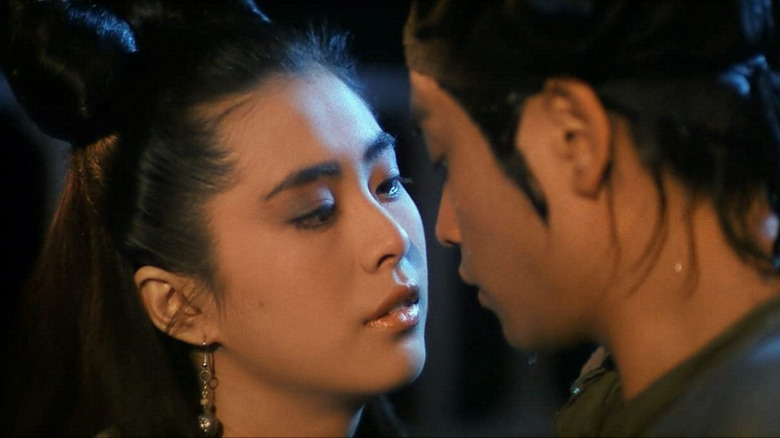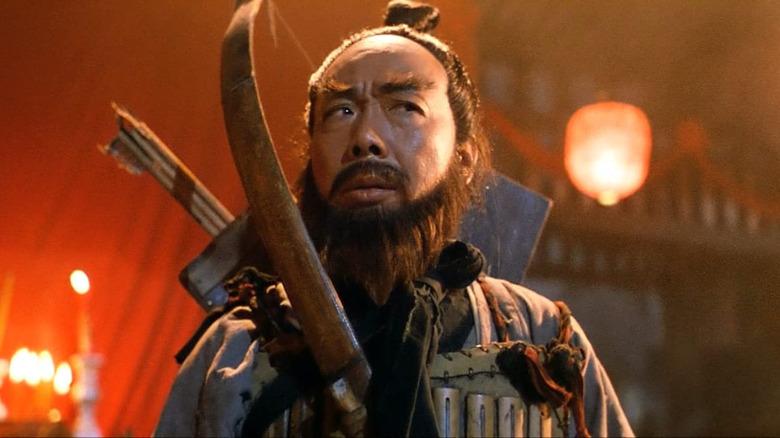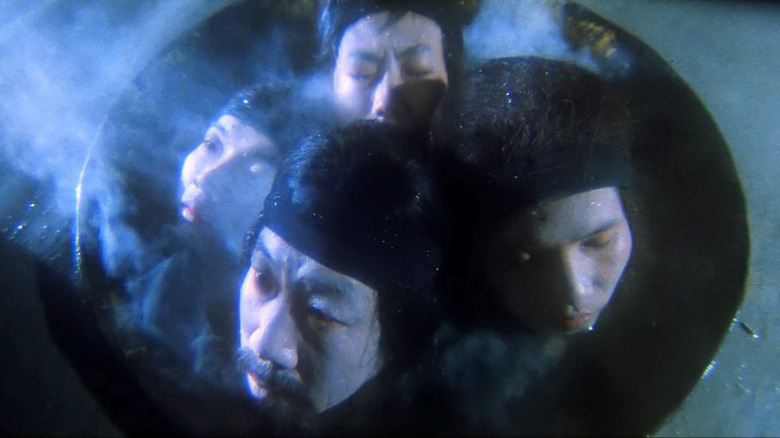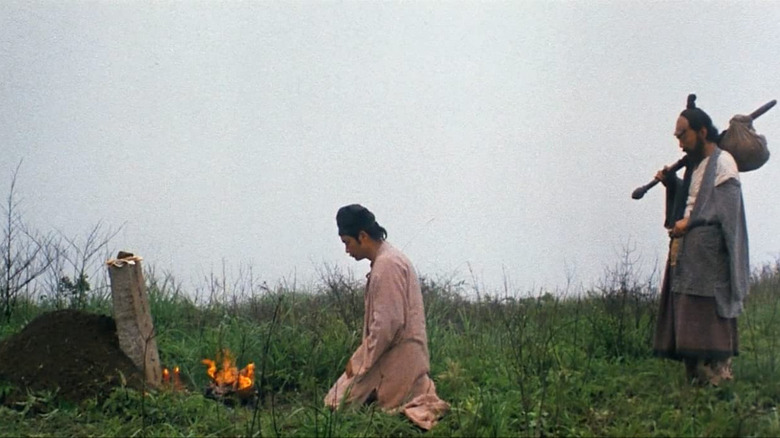The Daily Stream: A Chinese Ghost Story Is Hilarious, Horrifying, And Heartfelt
(Welcome to The Daily Stream, an ongoing series in which the /Film team shares what they've been watching, why it's worth checking out, and where you can stream it.)
The Movie: "A Chinese Ghost Story"
Where You Can Stream It: Amazon Prime Video
The Pitch: Take the exciting action and romance of a Chinese wuxia film, like "Crouching Tiger Hidden Dragon" or "Dragon Inn." Mix with it the horror schlock and Looney Tunes hijinx of a later "Evil Dead" movie. Add a touch of "Monty Python" style absurdism, and you have "A Chinese Ghost Story," directed by Ching Siu-Tung and produced by Hong Kong film industry legend Tsui Hark.
Our hero is Ning Choi-san, a hapless debt collector. Fresh out of money and desperate for a place to stay, he seeks out an abandoned temple in the woods to squat in. There he finds Nip Siu-sin, a beautiful young woman who wants to sleep with him. Choi-san is so lacking in social graces that he misses all of Siu-sin's cues, which is fortunate for him because Siu-sin is a treacherous ghost. Siu-sin finds herself falling for Choi-san's earnest ways, which is unfortunate for her because a vicious nearby tree spirit literally owns her bones. Do Choi-san and Siu-sin have a future together? It'll take Choi-san's strong will, Siu-sin's quick thinking and the help of a friendly Daoist monk to get them out of this mess.
Why it's essential viewing
Wuxia was dead to begin with, by the time "A Chinese Ghost Story" rolled into theaters in 1987. The golden age of directors King Hu ("Come Drink With Me") and Chang Cheh ("One-Armed Swordsman") had long since passed. The new wave of Hong Kong martial arts films were mysteries ("The Butterfly Murders,") comedies ("Encounters of the Spooky Kind"), and gangster films ("A Better Tomorrow"). To return to the genre meant either to knowingly do homage or to do something completely different. "A Chinese Ghost Story" splits the difference. One half of the film takes inspiration from the classic ghost story collection "Strange Stories from a Chinese Studio," a favorite of Chinese film directors including wuxia master King Hu. The other is a bizarre horror comedy with a rapping Daoist monk, camera tricks lifted from Sam Raimi films, and non-stop skewering of wuxia conventions.
The genius of "A Chinese Ghost Story" lies in its dual effectiveness as romantic adventure and uproarious spoof. The role of Choi-san is played by legendary Hong Kong superstar Leslie Chung, the modern equivalent of having Beyonce play the put-upon lead in your movie. But his relationship with Siu-sin (played by a young Joey Wang) is treated sincerely, and given a tragic ending in keeping with Chinese wuxia tradition. The film's action strikes a similar balance between comedy and seriousness, keeping fights convincingly dangerous even as the finale goes over the top and then some. Across the ocean in 1987, fellow cult classic "The Princess Bride" similarly found a happy medium between winking pastiche and sincere delivery. "A Chinese Ghost Story" does much the same for its chosen stomping ground, Hong Kong cinema.
The evil dead
Of course, "A Chinese Ghost Story" doesn't just feature great actors, exciting action, and a love that conquers death. It has ghosts! Producer Tsui Hark and his team had collaborated with Hollywood to create exciting special effects for his earlier extravaganza, "Zu: Warriors from the Magic Mountain." "A Chinese Ghost Story" tells a more down-to-earth tale, but features its share of memorable creatures including lurking zombies, an underworld lord whose cloak hides hungry severed heads, and a terrifying tree spirit. The tree spirit especially represents the gonzo exuberance of the project. Their initial form is intimidating enough, an enormous tongue that wraps people up and swallows them whole. But then the tongue splits open, revealing an even larger fanged maw inside of the tongue with its own set of horrible tendrils!
To sell its vision of goofy horror, "A Chinese Ghost Story" borrows heavily from Sam Raimi's "Evil Dead" films. The early appearances of the Tree Demon, heralded by a switch to first-person perspective as they hunt whichever hapless man is bedding Siu-sin, is a trick lifted from the very first "Evil Dead." The tree spirit itself animates surrounding branches to bind its prey, yet another riff on "The Evil Dead." Some of the funniest scenes in the movie split the difference between comedy and shlock horror, just as Raimi once did. As the hapless Choi-san wanders the forest temple, a posse of zombies reach from the ceiling and the floors. The scene whips from fear (is Choi-san a goner?) to hilarity (Choi-san keeps unknowingly evading their clutches) to absurdity (how is he still alive!?) without missing a beat.
Love, death, and rebirth
The goofiness and maximalism of "A Chinese Ghost Story" means that it isn't precisely scary. For nasty thrills, you're better off seeking Raimi's "Drag Me to Hell." But the special effects of "A Chinese Ghost Story" are lovingly detailed and still hold up. The temple skeletons and vengeful tree spirit remain impressive, and our heroes remain believably outmatched until the end despite coming into their own as fighters. According to Lisa Morton's "The Cinema of Tsui Hark," director Ching Siu-Tung and producer Tsui Hark were reportedly divided on whether to emphasize horror or romance. But I can't imagine the film without both.
"A Chinese Ghost Story" won a cult following not only in Hong Kong but also on the Chinese mainland. It would go on to spawn two sequels, an animated series, and a reboot. There's even a multiplayer Chinese RPG called "A Chinese Ghost Story," and if your franchise spawns one of those in China then you really have it made. The sequels have their charms, and continue to push the boundaries of special effects in Hong Kong cinema. But the original was a genuine lightning-in-a-bottle film, the kind you could swear was an accident if the crew weren't so skilled. While I'd recommend a viewer new to wuxia seek out "Dragon Inn" and "A Touch of Zen" for the best of the best, "A Chinese Ghost Story" just may be more fun.



